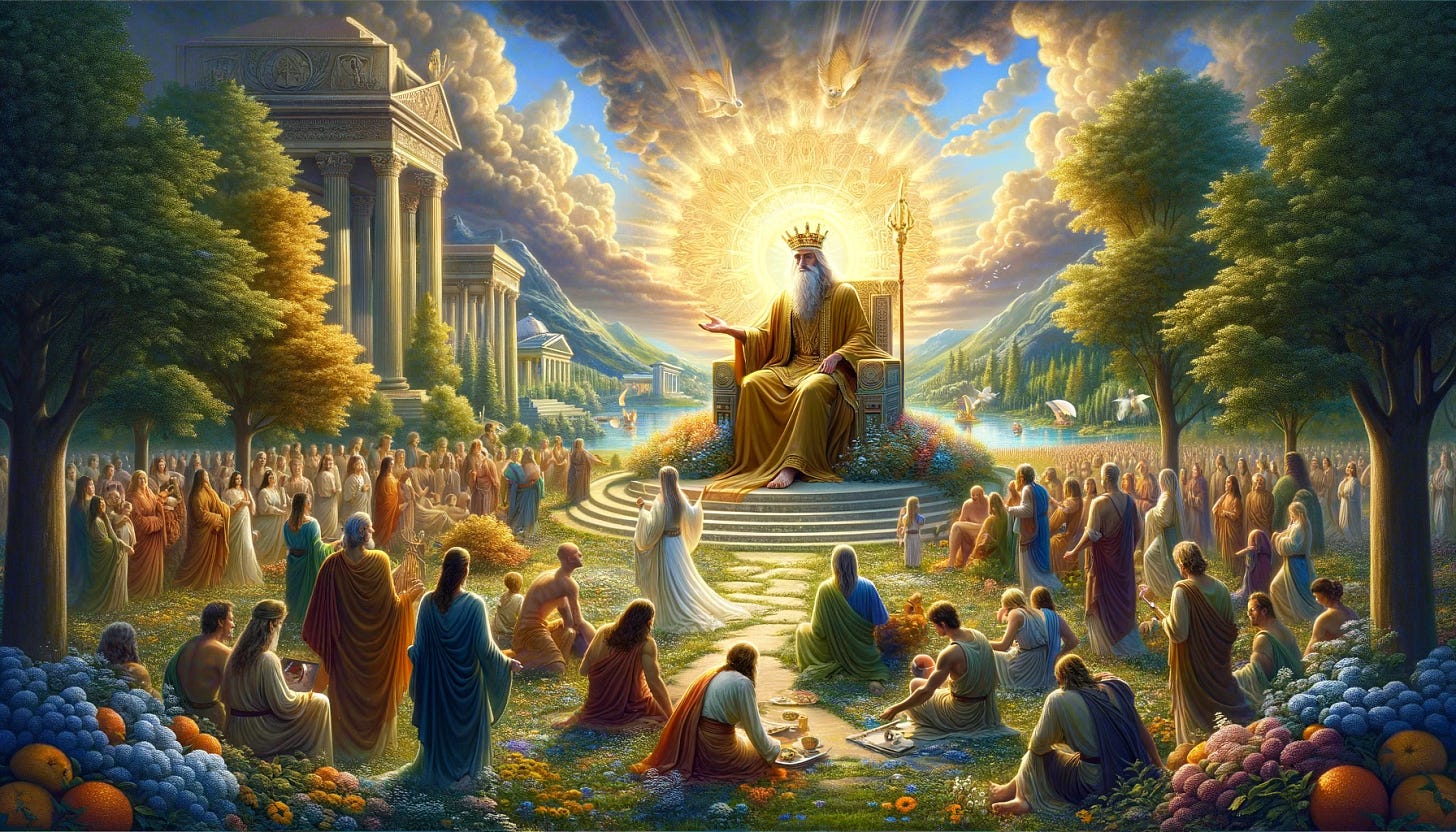Benevolent Dictatorship
A Human Expectation
Welcome to Polymathic Being, a place to explore counterintuitive insights across multiple domains. These essays take common topics and investigate them from different perspectives and disciplines to come up with unique insights and solutions.
Today's topic looks at governing structures that humans seem to do best under and explores why we seem inclined toward a benevolent dictator. When we step back, we find that this construct permeates almost all political philosophy whether that dictator is human or divine. Let’s dive in and poke at this odd idiosyncrasy.
In the early days of Polymathic Being, I wrote an essay on Quantum Superposition and Politics where I laid out how most of our thinking of political structures is binary. I detailed how I apply different government constructs at different layers to ensure their utility.
With my wife, I have an anarchistic relationship.
With my friends, I also have an anarchistic relationship.
With my kids, I’m a benevolent dictator.
At my extended family, social group, ie: ‘church’ level, I’m a socialist.
At the municipality/city level, I lean more toward the U.S. Democrat party.
At the state level, I’m more of a U.S. Republican.
At the federal level, I’m a Libertarian.
I go into more detail in the essay but suffice to say, there’s a lot of logic behind these applications. It’s also a great baseline to understand how politics doesn’t have to be a false binary of either/or affiliations.
This essay builds from that baseline and explores that, overarching all of these political ideologies, is another layer that I just can’t shake. It appears that humans are coded for benevolent dictators.
Benevolent Dictator
Carl, an Army buddy of mine, once mentioned this concept as we talked about why the war in Iraq, in which we both fought, seemed to be a failure at instilling the democratic values we appreciate in the United States. His response was simple. “Humans want a benevolent dictator.”
At first, I protested the idea. Clearly, humans did well with democracy and, just as clearly, dictatorships have a terrible history of failure. We debated back and forth and his argument started to make sense. Democracies are an outlier of world governance throughout history. It’s now been over fifteen years since that conversation and I still can’t disprove his thesis.
So much so that I played with the idea in Integration: Book Two of The Singularity Chronicles where, in Chapter 5, I have the antagonist mulling the same problem:
“Humans did their best with a benevolent dictator. They ended up placing them everywhere anyway whether in politics or religion. Atheistic communism wasn’t any different from theistic Christianity as they both attempted to use a benevolent dictator to establish social consistency and egalitarianism. The failure of communism had more to do with the limitations of humans than the idea.”
Then again, in Chapter 15 I thread the idea back into the conversation:
“Humans needed a benevolent dictator. He’d seen it over and over on Earth whether it emerged as a god, a king, or a leader. Democracies thought that group rule was the best but their citizens still elevated demagogues and celebrities or tolerated the civil government while holding their own religious affiliations of dictator gods above it.”
Bear with me a minute more as I expound on this last example.
In the United States, the entire governmental structure as a Constitutional Republic with democratic processes is still under the auspices of something else that is clearly detailed in the Declaration of Independence:
The unanimous Declaration of the thirteen united States of America, When in the Course of human events, it becomes necessary for one people to dissolve the political bands which have connected them with another, and to assume among the powers of the earth, the separate and equal station to which the Laws of Nature and of Nature's God entitle them, a decent respect to the opinions of mankind requires that they should declare the causes which impel them to the separation.
We hold these truths to be self-evident, that all men are created equal, that they are endowed by their Creator with certain unalienable Rights, that among these are Life, Liberty and the pursuit of Happiness.
Nature’s God… a benevolent dictator, has endowed humans with unalienable rights. The human government must not violate those rights, and the government is not the one who bestows those rights.
Therefore, the United States was founded under a benevolent dictator and administered by us humans with significant separations of powers (The President, Congress, and The Supreme Court) and tons of checks and balances to try to keep power distributed to the citizens.
As my character explores in the book, we are constantly placing a benevolent dictator in charge of our lives whether they are social media influencers, politicians, demagogues, celebrities, or religious deities.
For a great example, just look at U.S. politics and see how people have elevated the presidency to higher and higher powers. Even more so, look at how people react when their president is in power vs. the opponent. I used to joke that many Democrats had placed a divine benevolence on the president and when Donald Trump was elected they reacted as if we just elected the Antichrist as Pope. In contrast, others viewed him as a savior.1
Contrast with Anarchy
My friend and fellow Substacker Bill Buppert who authors Chasing Ghosts: An Irregular Warfare Podcast has debated this topic with me for a few years. He’s an ardent Anarchist (as a political philosophy) and holds that humans can operate independently from a governmental structure.
While I agree that some humans can do this, my experience is that the vast majority work a lot better by reducing the complexity of negotiating relationships and function best under clear, and often seemingly dictatorial direction.
As I explored in Quantum Superposition and Politics, Anarchy doesn’t scale very well outside of the capability of humans to maintain close relationships. So Anarchy isn’t a useful political philosophy writ large when the vast majority struggle to follow it. Not only struggle to follow it, but seem coded toward being told what to do vs. operating with their own agency.
Why else is religion so prevalent? Why else do we find people aligning with tribal affiliations in politics, social structures, and more? The more I poke at it, the more I find that almost all humans follow one or more forms of a benevolent dictator.
In Application
So what do we do about this finding? I think it’s important to identify this inclination because it’s such a cornerstone for what a good governance structure might look like.
You may have noticed in my layers of politics, I’m a benevolent dictator to my children. The Jungian archetypes would call this a Good King, the positive manifestation of the masculine that we explored quickly in Chaos and Order. This Good King is the balance of structure, benevolence, love, and direction that allows a child to grow into a healthy adult.
The Good King provides the necessary order and is balanced with the feminine to create an antifragile system. It’s no wonder our ancient archetypes celebrate them and we resonate with them as a society. I’ll add to this that my goal for my children is to mature them to the point that we have an anarchistic relationship when they enter adulthood. I don’t want to continue being a benevolent dictator to them, I want them to grow up to be their own capable humans.
The constant failure of human-led dictatorships is more of a function of tyrannical leadership than a problem with the role itself. The Jungian archetype of the negative masculine is the Tyrannical Father and there is definitely an inclination toward that behavior. We have a saying in English:
“Power tends to corrupt; absolute power corrupts absolutely” - Lord Acton
The benefit of a divine dictator is there’s nothing to corrupt.
The problem with a human dictator is there is everything to corrupt. The ancient Mesopotamian structures took this into account with their emperor:
“The Mesopotamian emperor was regarded as possessed of sovereign authority insofar as he manifested the spirit of Marduk: insofar as he was willing to pay attention (referring to the god’s multiple eyes) and to speak the magic words of truth. Every New Year’s day, he was taken outside the walls of his home city, stripped of his kingly attire, and forced by the priests to recount all the ways that he had not been a good Marduk in the previous year.”2
It was their way to ensure a benevolent dictator and not a tyrannical one by holding them accountable to the ultimate benevolent dictator, the God Marduk himself.
Everywhere I look, I find that most governance structures, and even anarchy within the individual, all look to something higher to justify their actions. You don’t have to go far to find humans following and even yearning for a benevolent dictator.
My question for each of you is: which benevolent dictators do you follow? Are you even aware that you are? It’s an important question to answer when we start considering future governance structures that maximize human growth and success.
What might a new governance structure look like if humans are inclined toward a benevolent dictator? I’d love to hear your thoughts in the comments below!
Integration is now on sale and you can grab a copy on Amazon!
Enjoyed this post? Hit the ❤️ button above or below because it helps more people discover Substacks like this one and that’s a great thing. Also please share here or in your network to help us grow.
Polymathic being is reader-supported. These essays are all free but your financial support goes a long way to helping keep these open for everyone!
Further Reading from Authors I really appreciate
I highly recommend the following Substacks for their great content and complementary explorations of topics that Polymathic Being shares.
Goatfury Writes All-around great daily essays
Never Stop Learning Insightful Life Tips and Tricks
Cyborgs Writing Highly useful insights into using AI for writing
One Useful Thing Practical AI
Educating AI Integrating AI into education
Mostly Harmless Ideas Computer Science for Everyone
The Republicans do the same and it makes a great example for the desire of a benevolent dictator on both sides. (as long as it’s the benevolent dictator they agree with…)






I don't know what the future of leadership is like but I'd love to see the 'Marduk ritual' enacted in the U.S. in Canada. Maybe not so religiously-specific in our spiritually diverse countries but just imagine if, say, during the State of the Union, the President had to devote time to telling everyone where he fell short of, say, adhering to his Oath of Office and recount everything he felt he did wrong (with prompting by others if they need to jog his memory). Imagine Biden having to do that. Imagine *Trump* having to do that. I would like to subject Prime Minister Trudeau and all future Prime Ministers to this.
Giving away all responsibility is a great deal when you count up all the things you now don't have to worry about.
Maybe it's the East Asian in me but I am very down for benevolent dictatorship.